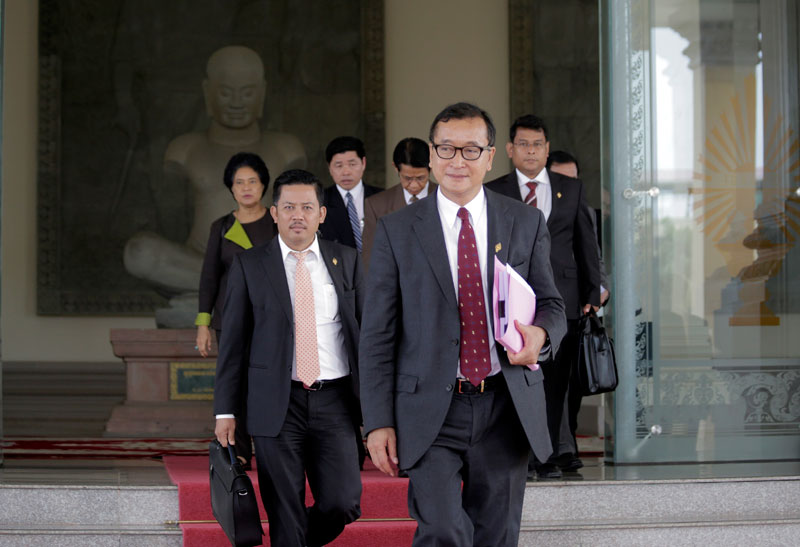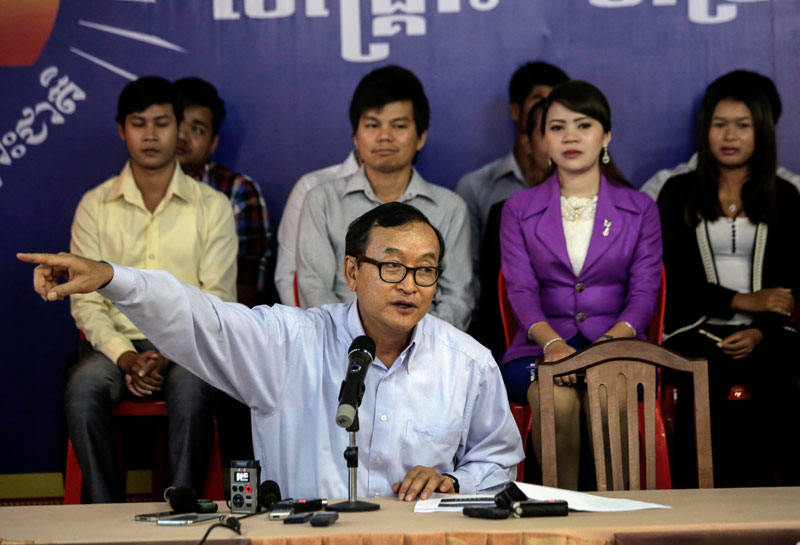Following his abrupt departure as the head of Cambodia’s opposition, Sam Rainsy said on Monday that he would fully remove himself from all roles within the party, including fundraising from abroad.
However, Prime Minister Hun Sen’s main adversary for the past two decades refuted suggestions that it was an “end of an era” in Cambodian politics and maintained that he still perceived himself as the primary “symbol of resistance” against the ruling party.

Speaking from his home in Paris, where he is living in exile, Mr. Rainsy said he had no intention of still pulling strings from afar after stepping down on Saturday in the face of the government’s threats to dissolve the entire party over his criminal record.
“First, I am no longer responsible for the day-to-day operations of the party,” Mr. Rainsy said. Relieved of those duties, he said, “I will have time to elaborate on my vision for Cambodia.”
“My ideas, my plans, my vision will be available for everybody, for every party. I would be happy whoever implements my ideas if they are good for the country and in my view they are good for the country,” he added.
Despite maintaining “moral and intellectual” ties with the party he formed in 2012 with former Human Rights Party leader Kem Sokha, who is now the opposition leader, Mr. Rainsy said he would step back from efforts to seek financial assistance from supporters overseas.
“No, I am not in a position, I am not entitled, I am not willing, to do that anymore because it would not be consistent with my current status,” he said.
“I just cut ties from an administrative point of view…but the ties are still very strong from a moral and intellectual point of view.”
Despite Mr. Rainsy’s vow to step away from the inner workings of the CNRP, he was adamant that this did not indicate an end to his political life.
“It is not an end of an era, this is the continuation for democracy in Cambodia, maybe in a more effective way,” Mr. Rainsy said.
“Some people ask if my resignation means the end of my political career. I answered…that a politician’s career is likely to last as long as there is popular support for him to fulfil his mission as assigned by the majority of his nation,” he said.
Mr. Rainsy was banned from Cambodia in October, about a year after he decided to enter self-imposed exile to avoid a two-year prison sentence for an old defamation conviction against Deputy Prime Minister Hor Namhong.

The erstwhile opposition leader, who had pledged to return before next year’s national election, said he still hoped to come home soon.
“I have always hoped and I’m sure I will be able to return to Cambodia as a free man and the sooner the better. This is my hope but I will do what I can because I am entitled, this is my right, even as an ordinary citizen to be able to come back to my country,” he said.
Senior CNRP lawmaker Mu Sochua said she was not worried about the impact of Mr. Rainsy stepping away from his international campaigning and fundraising.
“In fact, his resignation has led to more fire for this movement for change. If you look at the last two or three days since the weekend…it’s a really, really amazing energy that we’re seeing all over,” she said.
Ms. Sochua shunned any suggestion that Mr. Rainsy’s departure could lead to loyalists staying away from the polling booths in upcoming commune and national elections, and said fears of a split in the party were unfounded.
“If you’re saying that, you’re not listening to what the people are saying over the weekend and now,” she said. “The new spirit is stronger. Of course it’s a new chapter, because Sam Rainsy is not leading the opposition, but Sam Rainsy is not going away. He will continue to lead the movement for democracy.”
“He is above politics now,” she added.
Tararith Kho, a Cambodian poet who lives in Lowell, Massachusetts, said Mr. Rainsy was still perceived as a “hero” by many and that the popularity of the CNRP, which he estimated had the support of at least 70 percent of Cambodian-Americans there, would probably not be damaged.
“At first, they were sad. But they know that he is a really democratic person, and so they still support the CNRP,” he said.
However, Mr. Kho said he was waiting to see who officially takes the helm of the party—a decision that isn’t expected until the party’s convention next year—before deciding whether to back the opposition, adding that he hoped Prince Sisowath Thomico would get the job.
Kamara Kay, a politician from Lowell, said he believed most CNRP supporters in the U.S. would see the “bigger picture” and maintain their loyalty to the opposition party.
“I have not seen anyone say, ‘I’m giving up now that Sam Rainsy no longer runs the party,’” he said. “I firmly believe he is not going to go away.”



